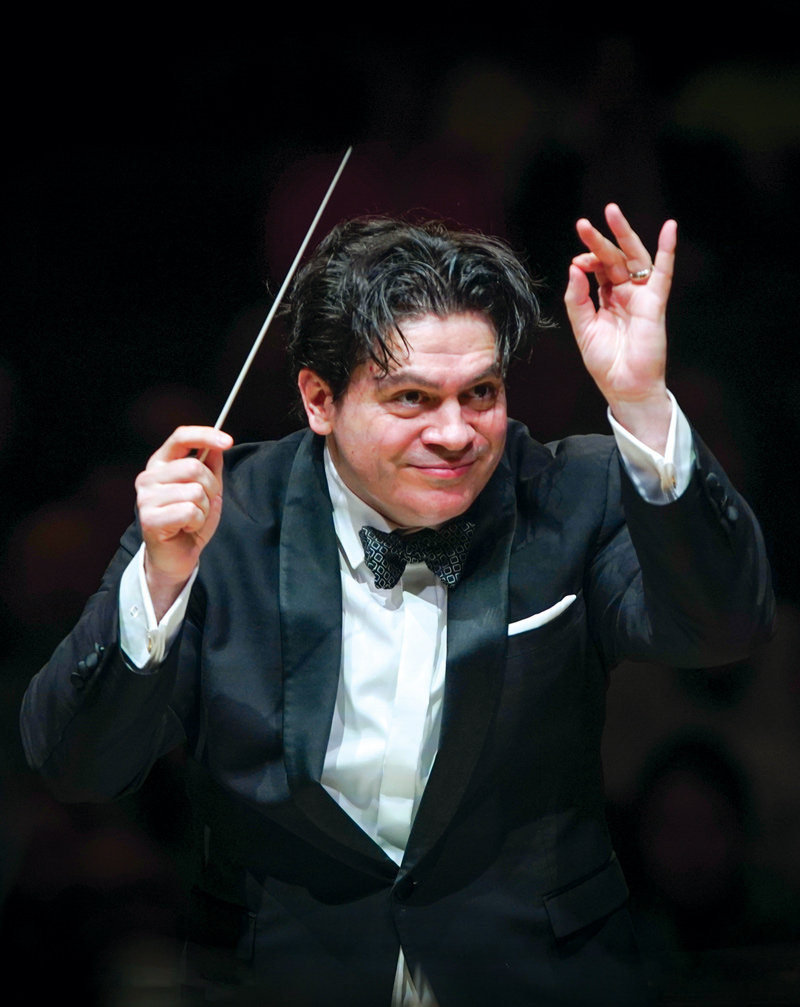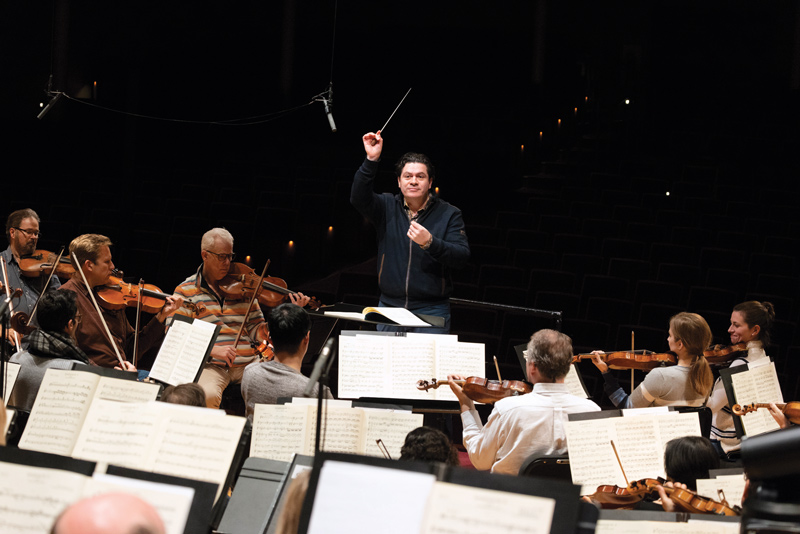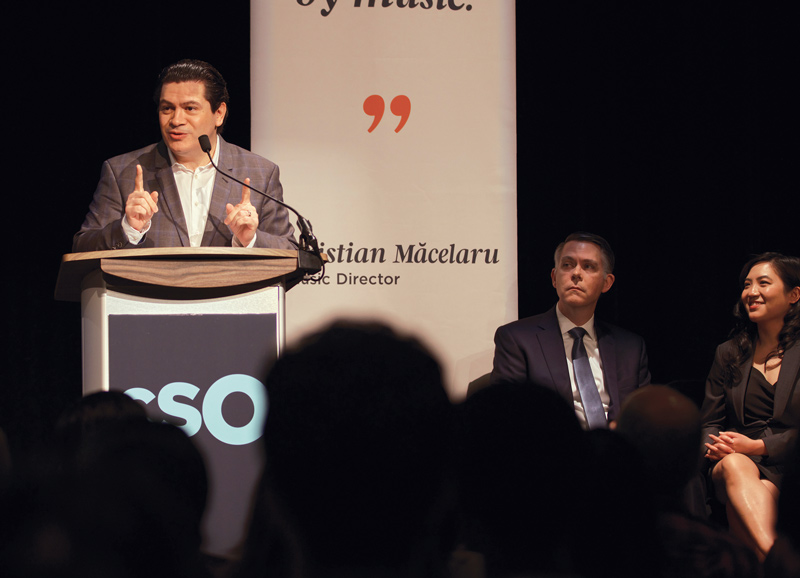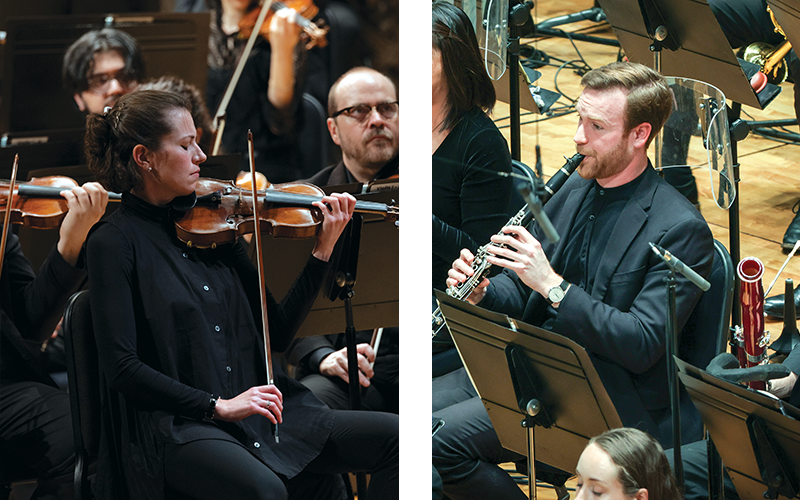Getting to Know Cristian Măcelaru, Part IV
In this final installment of the Fanfare Magazine series introducing Music Director Designate Cristian Măcelaru, we learn what is next and how he plans to fulfill his vision for the Orchestra.

Music Director Designate Cristian Măcelaru. (Credit: Mark Lyons)
by James M. Keller
When we spoke in mid-February, Cristian (“Cristi”) Măcelaru had just finished conducting his final week of concerts as the Cincinnati Symphony Orchestra’s Music Director Designate and was chomping at the bit to drop the “Designate” from his title. Since then, he’s been busy leading the two ensembles he has been most closely associated with in recent years: his final concerts as music director of the WDR Sinfonieorchester, in Cologne and on tour to other German cities, and the remainder of his penultimate season as chief conductor of the Orchestre National de France, in Paris and on tour to South Korea and China. In addition, he’ll sandwich in guest conducting weeks with the Tonhalle-Orchester Zürich and the Minnesota Orchestra. That takes Cristi to the end of June, when he turns his attention to the Cabrillo Festival of Contemporary Music in California, where he is music director/conductor, followed by a return to the Interlochen Center for the Arts, where he holds the title of artistic director and principal conductor of the World Youth Symphony Orchestra. Cristi’s summer will finish with the George Enescu Music Festival in his native Romania, which he oversees as artistic director — a gathering of some 80 ensembles from 28 countries. And then, before you know it, the calendar will read “October 3, 2025,” when he will ascend the opening-night podium as the Cincinnati Symphony Orchestra’s 14th Music Director.
He found his “designate week” very beneficial. “This week gave me a better sense of the work ahead, of what I need to do, and how,” he said. “People have asked me what I want to change with the Cincinnati Symphony Orchestra. The reality is that you can’t decide on something like that without really working with the Orchestra. It’s not predetermined; it emerges when you are building something together. The more I work with the Orchestra, the more I see how I can have an impact in a positive way, with how I would like things to develop.”

Cristian Măcelaru leads his first Orchestra rehearsal as Music Director Designate, February 2025. (Credit: Charlie Balcom)
But even as he looks forward to that process of discovery, he knows that it will take place above what is already very firm bedrock. He was already struck by the Orchestra’s strengths when he dropped in on past performances. “When I listened to them from the audience, I remember being very impressed with the virtuosity of their tight, fast ensemble. This was really impressive. It’s not just a question of playing together, but of playing as a unified body — and that is what they did. I really admired it. And the sound the Orchestra is producing is very appropriate; there’s a brightness and directness to it that I find really good. I want to keep these elements that define their identity. My challenge and work will likely be expanding the understanding of the sound and how it relates to different repertoire, to different periods of music. It is less about the sound of the Cincinnati Symphony Orchestra and more about the identity of each individual composer as interpreted by the CSO.”
The upcoming season will provide ample opportunities for delving into repertoire-specific sounds. Cristi will conduct seven different programs across 13 concerts, the whole comprising 18 compositions written from the 18th century through yesterday. (Because conductors’ calendars come together years in advance, his presence during the 2025–26 season will be a bit less than the “minimum 10 weeks per season” he envisions in ensuing years.)

Cristian Măcelaru discusses his vision for the Orchestra’s 2025–26 season, his first as Music Director, as CSO President and CEO Robert McGrath looks on. (Credit: JP Leong)
Concertmaster Stefani Matsuo observes, “Our Orchestra is fortunate to play a wide variety of repertoire, which keeps us incredibly well rounded as musicians. Cristi supported this aspect when he was a candidate to be Music Director. He supports the idea that programs can’t all be ‘meat and potatoes,’ and, alongside our glorious standard repertoire, we need to include pieces that might become standard repertoire going forward. That outlook matches the CSO’s past history and its vision of the future.” So, along with promoting new music, Cristi is “also super-interested in Baroque and early Classical playing styles,” Matsuo continues. “Next year, he will explore that direction when he conducts Handel’s Messiah.”
On the one hand, directing Messiah is hardly a revolutionary act. Many major orchestras offer it as an annual holiday tradition. What is less usual is for an orchestra’s music director to lead it. More typically it provides an opportunity to welcome a guest conductor who specializes in early music or choral music. But Cristi happens to love conducting choral music, and he has had hands-on involvement with Baroque style. Back when he was climbing the ranks as a violinist, he studied Baroque violin, with its many nuances that differ from modern practice. In fact, his violin professor at Rice University was Sergiu Luca, who is thought to be the first person to record Bach’s Unaccompanied Sonatas and Partitas on a Baroque violin. “I spent a portion of my life becoming as close to being an expert on Baroque performance practice as I could be,” says Cristi, “but I now get to do so little of it, since that usually goes to specialists. We will not take a purist approach in the sense of using Baroque-era instruments and bows, but we will hope to find a fusion of historical style that also respects the possibilities of modern instruments.”

A sampling of contemporary works will also be on his schedule in 2025–26, including works co-commissioned by the CSO from Icelandic composer Daníel Bjarnason and American Lisa Bielawa. Matsuo observes, “The CSO has held on to the belief that new music can easily become part of the orchestral canon. [Cristi] does a lot with new music and he has friends who are successful composers, so I am very excited that we will have the opportunity to work with him in that area.”
He will also offer a solid serving of “meat and potatoes” — Beethoven, Brahms, Barber and others — but even those may harbor surprises. Mahler’s symphonies, for example, have long been part of the CSO’s repertoire: the Orchestra played the American premieres of his Fifth (in 1905) and Third (in 1914) symphonies, and, in just the past seven years, it has played seven of his nine symphonies. They would have played eight, leaving only Mahler’s Ninth missing from recent programming, but a planned performance of the Third Symphony was cancelled during Covid times. Which Mahler symphony will Cristi conduct next season? None of them. Instead, he will lead the composer’s Totenfeier, a rarely played symphonic poem from the beginning of Mahler’s career that evolved into the opening movement of his Second Symphony. “I wanted to start working on Mahler,” Cristi explains, “since he is a composer I really want to explore in Cincinnati. This will take us to the beginning of it all.”
Cristi likes to approach even familiar pieces with fresh eyes. Principal Clarinetist Christopher Pell played in a performance of Shostakovich’s Symphony No. 11 that Cristi conducted last season when he was still under consideration to become Music Director. “There’s a lot in that piece that can introduce you to a conductor’s approach, their philosophy, their identity as an interpreter,” says Pell. “It was clear that he cared deeply about what was on the page, that he was intent on being an honest arbiter of what Shostakovich intended, in the context of who he was and how he lived. It was a similar approach this February with Dvořák’s New World Symphony. [Cristi] talked about Dvořák and the way he would mark his parts, how to interpret those markings, how the same markings for different composers can mean different things. Discrepancies can be little pieces of treasure.”

Talking is not necessarily a way for conductors to endear themselves with orchestra players, who generally want to spend their time making music. “I think he talked somewhat more when preparing the Dvořák than he did a year ago with Shostakovich,” Pell notes. “This year, of course, there’s an element of him wanting to introduce himself, how he thinks about certain large concepts. But his interpretation is in his beat patterns, in how he communicates while conducting.” Cristi, who has had much experience as an orchestral violinist, is well aware of the peril of long-windedness. “Many musicians complain about conductors who overly enjoy hearing the sound of their own voice,” Pell allows. “But I have never heard an orchestra complain if the conductor has something meaningful to say, something that can improve the performance.”
“There has always been a sense of camaraderie between him [Cristi] and the musicians, onstage and off,” says Matsuo. “During the search period it was clear he was the right person at the right time. His chemistry with the Orchestra is undeniable, and we really respond to how, in conversation, he shares our views about our role as musicians in the community, about making music available for everybody, about how we can make the experience of great music meaningful for our audience.”
Shortly after his selection as Music Director was announced in April 2024, Cristi held a Zoom meeting with all members of the Orchestra. “They seemed surprised that I asked questions,” Cristi recalls. “Somebody asked if I would tell them what I would like to record, and I said, ‘Of course, but how about you?’ The response was, ‘Well, you’re the Music Director. We want to know where you are taking us.’ That gave me a deep sense of our relationship; they have their individual passions and desires, but they were even more focused on how they wanted to embrace my vision.”
So it is with the music-making itself. Matsuo sums it up: “He projects a nice balance of being the ultimate person we look to for interpretation, but he also trusts us to make that vision happen with our instruments. He was an orchestral musician, so he knows what we need. In terms of sound and character, he holds us to a high standard. He will only improve what we already have going for us.”